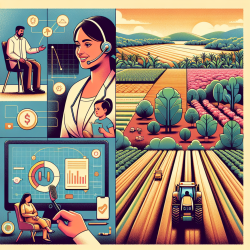Introduction
In the realm of speech-language pathology, particularly in the context of online therapy services like those offered by TinyEYE, it is essential to continuously seek innovative strategies to improve therapeutic outcomes. A recent study titled "Characterising the Spatial Distribution of Opportunities and Constraints for Land Sparing in Brazil" provides insights that, although primarily focused on environmental and agricultural domains, can offer valuable lessons for enhancing online therapy practices.
Understanding the Research
The study explores the potential of land sparing in Brazil, a strategy that aims to reconcile the country's roles as a biodiversity hotspot and a leading agricultural producer. By increasing yields on existing farmland and sparing land for nature, the study identifies opportunities and constraints that can influence the success of such policies. Key factors include access to technical advice, labor availability, land tenure security, and educational attainment.
Applying Research Insights to Online Therapy
While the research focuses on land sparing, its findings can be metaphorically applied to online therapy services. Here’s how:
- Technical Advice and Support: Just as technical advice is crucial for adopting high-yield farming practices, continuous professional development and access to expert guidance are vital for speech-language pathologists to implement effective online therapy strategies.
- Labor Availability: In therapy, this translates to having a skilled team capable of delivering diverse and tailored therapeutic interventions. Ensuring adequate staffing and training can mitigate the risk of burnout and enhance service delivery.
- Security and Stability: Analogous to land tenure security, providing a stable and supportive environment for therapists encourages long-term commitment and innovation in therapy practices.
- Educational Attainment: Just as education empowers local actors in land sparing, ongoing training and education empower therapists to adopt new methodologies and technologies in their practice.
Encouraging Further Research
Practitioners are encouraged to delve deeper into the parallels between land sparing strategies and therapy practices. By exploring these intersections, therapists can identify innovative approaches to overcome constraints and maximize the potential of online therapy services.
Conclusion
The study on land sparing in Brazil offers a unique perspective that can inspire speech-language pathologists to enhance their online therapy practices. By focusing on data-driven strategies and continuous improvement, practitioners can create better outcomes for children in their care.
To read the original research paper, please follow this link: Characterising the spatial distribution of opportunities and constraints for land sparing in Brazil.










